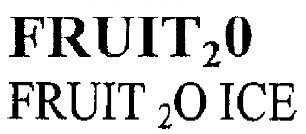TTAB Finds "SOY2O" and "FRUIT2O" Not Confusingly Similar for Flavored Water
For a refreshing change, third-party registrations helped a trademark applicant overcome a Section 2(d) refusal to register. The Board reversed the PTO's refusal of the mark SOY2O for "flavored drinking waters; [and] non-alcoholic tea-based beverages containing soy isoflavones," finding the mark not likely to cause confusion with the two registered marks shown immediately below for non-alcoholic beverages, including "fruit flavored drinking water," and fruit flavored frozen confections, respectively. In re LBI Brands, Inc., Serial No. 78295721 (June 16, 2006) [not citable].

As to the goods, the Board agreed with the PTO that Applicant's flavored drinking waters are identical to, or otherwise related to, Registrant's goods identified in its FRUIT2O registration. However, as to the FRUIT2O ICE registration, the PTO's single third-party registration covering Applicant's goods and frozen confections was insufficient to show that these products are related.

As to the marks at issue, the Board agreed with Applicant LBI Brands that they convey very different commercial impressions. The Board deemed the PTO's approach -- that the marks are similar because they each comprise the name of the ingredient and the term "20" -- too "formulaic."
"The different words FRUIT and SOY give the marks a different appearance and pronunciation. Further, the marks have different connotations. Applicant's mark SOY2O suggests a beverage which contains soy. Registrant's mark FRUIT2O suggests a fruit flavored beverage and Registrant's mark FRUIT2OICE suggests a fruit flavored confection."
The Board also agreed with Applicant's contention that the term "2O" is a weak formative for beverages, as evidenced by eight third-party registrations for "2O"-containing marks for beverages:
"Although third-party registrations are not evidence of use of the marks therein, they are probative to the extent that they may show the meaning of a mark or a portion of a mark in the same way that dictionaries can. Mead Johnson & Co. v. Eckes, 195 USPQ 187 (TTAB 1977)."
In this case, according to the Board, these registrations indicate "that the term '2O' was chosen by the trademark owners as a shorthand reference to 'H2O' to convey that their beverages consist of or contain water." The Board therefore sided with LBI, ruling that registrant's marks "are not entitled to a broad scope of protection."
In sum, the Board found that, in view of the differences in the marks (and as to the frozen confections, the differences in the goods), there is no likelihood of confusion.

Text Copyright John L. Welch 2006.

0 Comments:
Post a Comment
<< Home